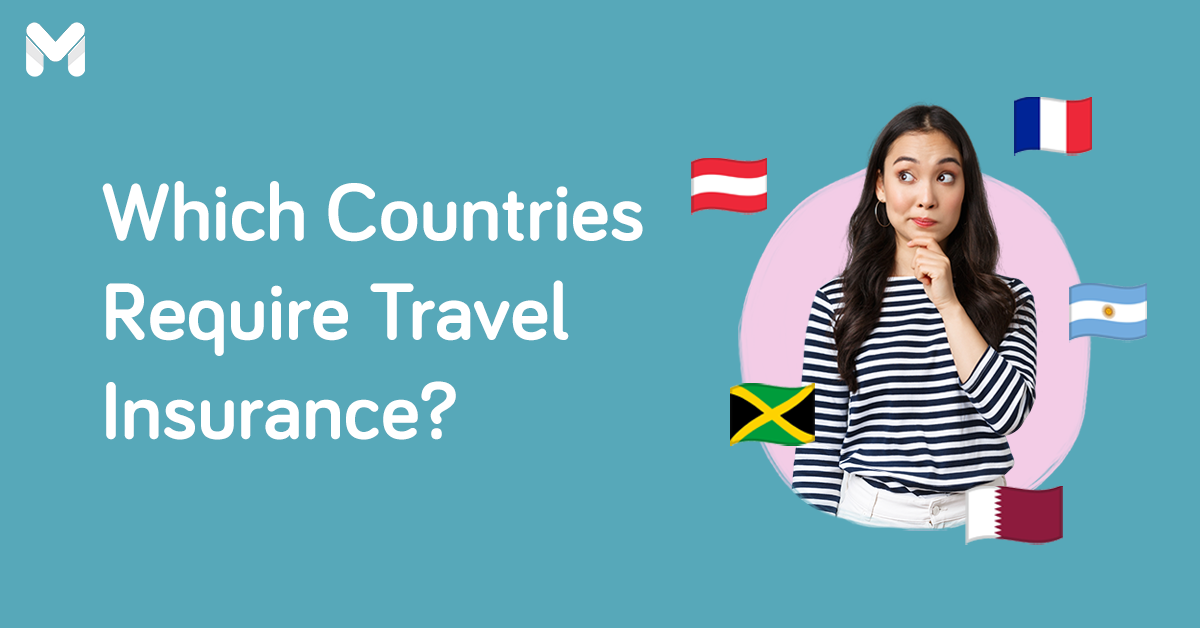Don’t want to be stuck at home sweating through record-high heat waves this summer season? Book a trip to the beach now and enjoy the sun against a more fun backdrop while swimming, surfing, snorkeling, island hopping—whatever your idea of cooling down is.
But before booking your flight to your tropical island destination, consider getting local travel insurance in the Philippines. After all, travel disruptions and inconveniences don’t discriminate—they can happen to anyone, anywhere, at any time. They’re not exclusive to international trips, so it's always a good idea to secure your domestic travels.
This article will highlight how you can protect your domestic trips financially with local travel insurance.
Do You Need Local Travel Insurance in the Philippines for Domestic Flights?
-Apr-23-2024-09-12-31-6742-AM.png?width=600&height=400&name=Pics%20for%20blog%20-%20600x400%20(23)-Apr-23-2024-09-12-31-6742-AM.png)
The short answer is yes. While travel insurance is more commonly associated with international travel, some insurance policies are made specifically to cover unexpected expenses for out-of-town domestic trips. Most insurance providers offer local travel insurance for popular destinations, such as Boracay, Palawan, Cebu, and Davao, that require air travel or maritime transport.
Like its international counterpart, local travel insurance offers a broad range of coverage options, including emergency medical expenses, travel assistance for common inconveniences like flight delays and lost luggage, and even accidental death or disability.
Typically, the maximum coverage amount for local travel insurance is lower than that of international. Nonetheless, it’s still best to cover all your bases before your next domestic trip.
👍 When Is Local Travel Insurance Necessary?
Insurance can cover you financially during situations out of your control, so being insured often means being spared the inconvenient aspects of travel.[1]
An example of local travel insurance coming in handy is when your non-refundable flight gets canceled or delayed because of inclement weather. Another applicable scenario is when you lose your luggage along the way. In both cases, travel insurance can help defray costs.
In short, the main purpose of travel insurance is to help you cover financial losses. If you can afford to rebook your canceled or delayed flight, then you can forego local travel insurance. However, if you don't want to waste even a single peso, get your flight insured so you’re always ready to tackle any travel setback.
On top of travel inconveniences, your travel insurance can also cover emergency medical expenses. Even if you already have a health insurance plan, this benefit can further minimize your medical expenses, especially when you’re away from your home city.
If you have an out-of-town trip planned soon, consider stretching your budget a little to avail of local travel insurance. It's better to pay a bit more upfront than to spend considerably more when unexpected scenarios arise.
👎 When Is Local Travel Insurance Not Necessary?
That said, getting travel insurance for local travel isn’t always necessary. Let's say you’re traveling just a few miles away from home. You might not need travel insurance, especially if you’re not traveling by air.
Another exception is when you’re on a business trip. You likely won’t need to get separate travel insurance if your company will cover your travel expenses.
Travel Insurance Coverage for Domestic Trips
-Apr-23-2024-09-14-00-3252-AM.png?width=600&height=400&name=Pics%20for%20blog%20-%20600x400%20(24)-Apr-23-2024-09-14-00-3252-AM.png)
Looking to secure local travel insurance in the Philippines but not sure what coverage options are available? Here are some of the most common travel coverages offered by insurance providers:
✅ Trip Interruption
Local travel insurance companies will reimburse you for expenses you incur when your trip is delayed or cut short for reasons covered by your policy. Note that you can’t file a trip interruption claim for any random reason—the cause must be valid.
Some commonly covered reasons include sickness of a family member during a trip, death of a family member, and interruptions caused by natural disasters like earthquakes and typhoons.
✅ Trip Delay
Domestic travel insurance can also cover expenses incurred due to delays caused by outside factors like unpredictable weather and mechanical malfunctions. This coverage includes meals, lodging, flight change fees, and other airport charges.
Note that there’s a waiting period before your travel delay benefit kicks in (usually between three to 12 hours). If your flight is delayed only an hour, it won’t count as a flight delay.
✅ Trip Cancellation
If you have to cancel an upcoming non-refundable flight, your local travel insurance can reimburse all or a portion of the costs, depending on the package you purchased.
This benefit comes in handy when an unavoidable scenario—be it bad weather, illness, injury, death of a family member, or any other valid disruptor—interrupts your travel plans. This benefit also covers cancellations made by the airline due to causes like natural disasters and technical difficulties.
✅ Baggage Loss, Delay, or Damage
There’s always a possibility your luggage gets lost or damaged in transit. In some cases, you can no longer retrieve the valuables you’ve lost.
But with travel insurance, you can at least get reimbursed for the inconvenience you experienced. Some insurance providers even cover lost travel documents, money, and other important items you had in your luggage.
✅ Medical Emergency
Even if you already have a health insurance plan, it’s still a good idea to get travel insurance with medical emergency coverage. This way, you have diversified fund sources to pull from in case of a health emergency during your trip.
Your local travel insurance policy can help fund surgeries, medicine, consultations, and other possible medical treatments, including COVID-19 costs. Note that most insurance policies exclude pre-existing conditions, so make sure to double-check your coverage with your insurance provider.
✅ Emergency Evacuation
Traveling always comes with risks. Whether you’re traveling by land, air, or sea, there’s always a possibility for accidents, so it's ideal to get insured for precisely this reason.
An emergency evacuation benefit includes medical evacuation when you get severely injured during a trip. It also covers the repatriation of your remains in the case of your death.
It’s not a happy scenario to think about, but covering your bases beforehand can save time, money, and the hassle of figuring out what to do the moment an unfortunate situation arises.
✅ 24-Hour Travel Assistance
Travel insurance for local travel also gives you access to your insurance provider’s 24-hour travel assistance services, allowing you to get any travel help you need wherever you are in the country.
Call your provider’s hotline to inquire about your insurance coverages, request assistance in managing lost baggage, file a claim, and even get general travel support for booking hotels and making dining reservations.
✅ Other Add-Ons
If you shop around for local travel insurance in the Philippines, you can find more add-ons to make your policy even more comprehensive. Here are a couple of benefits you can add to your existing coverage:
- Accidental Death and Dismemberment - While this is mostly offered for international travel, you can also request to include it for your next domestic travel. You might end up with a higher premium because of this upgrade, but at least you get extra protection for extreme situations during your trip.
- COVID-19 Benefits - While COVID-19 is still a real issue, it’s no longer a lingering threat in the Philippines. In fact, it has been on a downward trend for the past months. Still, to be extra cautious, you have the option to add this coverage to your local travel insurance policy. COVID-19 benefits cover quarantine-related expenses and treatment costs during your trip.
❌ Policy Exclusions
Just like any other insurance product, your local travel insurance policy has its limitations. Before getting insurance, manage your expectations by taking note of these common insurance exclusions:
- Pre-existing conditions
- Pregnancy and childbirth
- Pandemics (except COVID-19)
- Civil or political unrest
- Injuries from extreme sports or activities
- Mental health costs
- Accidents, injuries, or death due to drug or alcohol use
Options for Domestic Travel Insurance in the Philippines
-Apr-23-2024-09-15-35-6908-AM.png?width=600&height=400&name=Pics%20for%20blog%20-%20600x400%20(25)-Apr-23-2024-09-15-35-6908-AM.png)
While planning your next trip, compare local travel insurance options in the Philippines to find one that perfectly suits your travel needs.
Top choices include Oona Travel Insurance and PGAI Travel Insurance. Compare the two[2], [3] below and apply directly for a policy by clicking the respective buttons:
|
Provider
|
Trip Interruption
|
Trip Delay
|
Trip Cancellation
|
Baggage Loss / Delay / Damage
|
Medical Emergency
|
Emergency Evacuation
|
Accidental Death / Dismemberment
|
COVID-19 Coverage
|
|
Oona Travel Insurance
|
Up to ₱50,000
|
Up to ₱2,000
|
Up to ₱50,000
|
Up to ₱15,000 (₱2,000 per item)
|
Up to ₱1 million
|
Actual Cost
|
Up to ₱1 million
|
100% of the medical coverage limit
|
|
PGAI Travel Insurance
|
Up to ₱50,000
|
Up to ₱1,000 per 6 hours; maximum of 96 hours
|
Up to ₱50,000
|
Up to ₱50,000 (₱10,000 per item)
|
Up to ₱1 million
|
Up to ₱500,000
|
Up to ₱1 million
|
Up to ₱1 million
|
Note that premium rates vary depending on specific criteria, including your age, the length of your trip, the travel insurance package you availed of, and your destination.
While you can get travel insurance for individuals as young as a year old, senior citizens might be considered ineligible. Providers that do offer them coverage might impose a surcharge on their premium, so clarify this with your insurer before making a purchase.
Related:
- Travel Without Worries: What is Travel Insurance and Where to Get One
- PGA SOMPO Travel Insurance Review: Your Guide to Getting Insured
Final Thoughts
Getting local travel insurance in the Philippines can make all the difference. Travel mishaps can happen anywhere, so don’t forego getting a policy even if you’re traveling only domestically.
If you don’t want to waste money on rebooking flights, paying hefty fees for medical emergencies, or canceling non-refundable flights, make sure to secure your trip with travel insurance.
Sources:
- [1] Is Travel Insurance Worth It? (Forbes Advisor, 2023)
- [2] Oona Travel Insurance Application (Oona wesbite)
- [3] PGAI Travel Shield Insurance Application (PGAI website)










